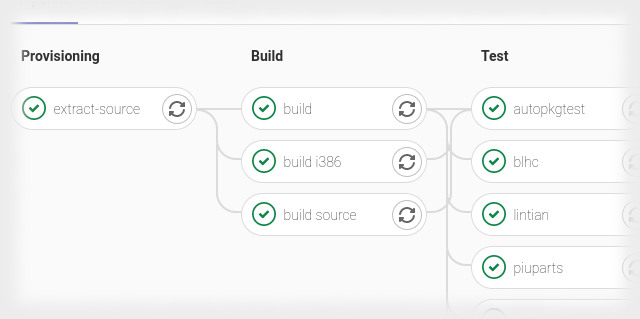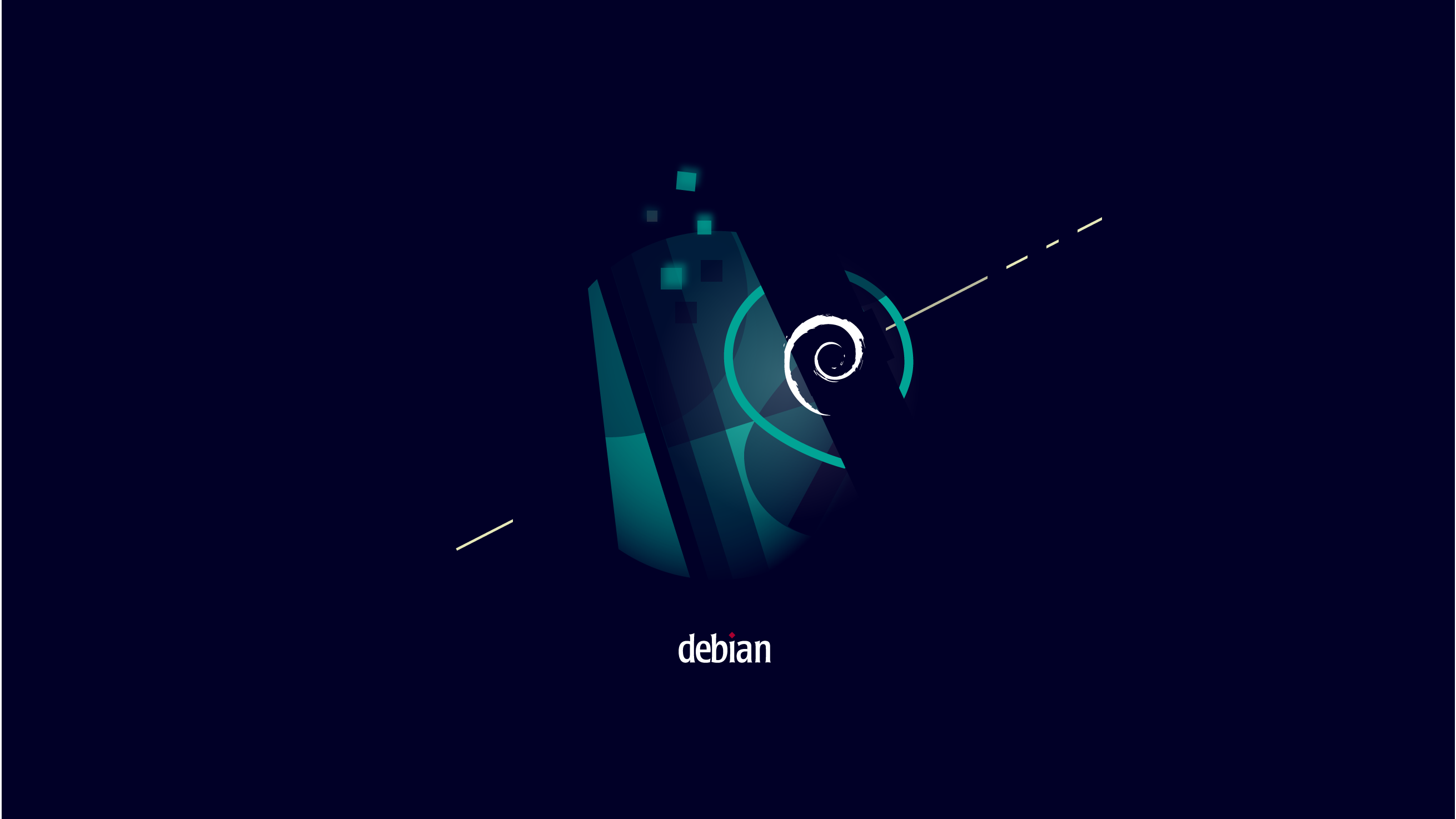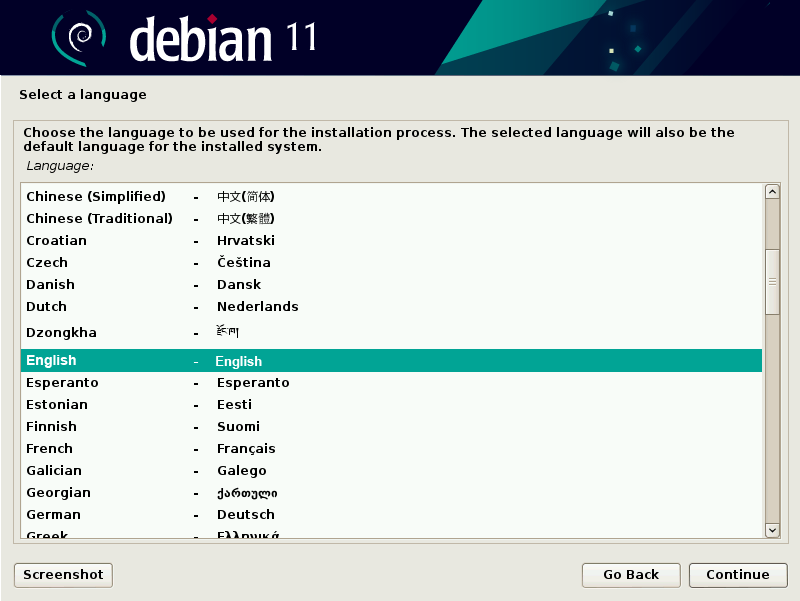"Homeworld" will be the default theme for Debian 11
On Thu 12 November 2020 with tags bullseye artworkWritten by Jonathan Carter
Artwork by Juliette Taka
Translations: fr pt-BR
The theme "Homeworld" by Juliette Taka has been selected as default theme for Debian 11 'bullseye'. Juliette says that this theme has been inspired by the Bauhaus movement, an art style born in Germany in the 20th century.
After the Debian Desktop Team made the call for proposing themes, a total of eighteen choices have been submitted. The desktop artwork poll was open to the public, and we received 5,613 responses ranking the different choices, of which Homeworld has been ranked as the winner among them.
This is the third time that a submission by Juliette has won. Juliette is also the author of the lines theme that was used in Debian 8 and the softWaves theme that was used in Debian 9.
We'd like to thank all the designers that have participated and have submitted their excellent work in the form of wallpapers and artwork for Debian 11.
Congratulations, Juliette, and thank you very much for your contribution to Debian!
Debian donation for Peertube development
On Wed 21 October 2020 with tags debconf20 donation fundraising peertubeWritten by Louis-Philippe Véronneau, Pouhiou, Laura Arjona Reina
Translations: fr pt-BR
The Debian project is happy to announce a donation of 10,000 € to help Framasoft reach the fourth stretch-goal of its Peertube v3 crowdfunding campaign -- Live Streaming.
This year's iteration of the Debian annual conference, DebConf20, had to be held online, and while being a resounding success, it made clear to the project our need to have a permanent live streaming infrastructure for small events held by local Debian groups. As such, Peertube, a FLOSS video hosting platform, seems to be the perfect solution for us.
We hope this unconventional gesture from the Debian project will help us make this year somewhat less terrible and give us, and thus humanity, better Free Software tooling to approach the future.
Debian thanks the commitment of numerous Debian donors and DebConf sponsors, particularly all those that contributed to DebConf20 online's success (volunteers, speakers and sponsors). Our project also thanks Framasoft and the PeerTube community for developing PeerTube as a free and decentralized video platform.
The Framasoft association warmly thanks the Debian Project for its contribution, from its own funds, towards making PeerTube happen.
This contribution has a twofold impact. Firstly, it's a strong sign of recognition from an international project - one of the pillars of the Free Software world - towards a small French association which offers tools to liberate users from the clutches of the web's giant monopolies. Secondly, it's a substantial amount of help in these difficult times, supporting the development of a tool which equally belongs to and is useful to everyone.
The strength of Debian's gesture proves, once again, that solidarity, mutual aid and collaboration are values which allow our communities to create tools to help us strive towards Utopia.
Salsa CI now includes i386 build support
On Fri 09 October 2020 with tags salsa i386Written by Salsa CI Team
Translations: pt-BR

Salsa CI aims at improving the Debian packaging lifecycle by delivering
Continuous Integration fully compatible with Debian packaging.
The main Salsa CI's project is the
pipeline, that builds
packages and run different tests after every git push to Salsa.
The pipeline makes it possible to have a quick and early feedback about any
issues the new changes may have created or solved, without the need to upload
to the archive.
All of the pipeline jobs run on amd64 architecture, but the Salsa CI Team has
recently added support to build packages also on i386 architecture.
This work started during the Salsa CI Sprint at DebConf20 after the
"Where is Salsa CI right now" talk,
and required different changes at the core of pipeline to make it possible.
For more details, this is the related merge request:
https://salsa.debian.org/salsa-ci-team/pipeline/-/merge_requests/256
If you have any questions, you can contact the Salsa CI Team at the #salsaci channel on irc.oftc.net
New Debian Maintainers (July and August 2020)
On Sat 19 September 2020 with tags projectWritten by Jean-Pierre Giraud
Translations: ca es fr pt sv vi zh-CN
The following contributors were added as Debian Maintainers in the last two months:
- Chirayu Desai
- Shayan Doust
- Arnaud Ferraris
- Fritz Reichwald
- Kartik Kulkarni
- François Mazen
- Patrick Franz
- Francisco Vilmar Cardoso Ruviaro
- Octavio Alvarez
- Nick Black
Congratulations!
Debian Local Groups at DebConf20 and beyond
On Wed 16 September 2020 Written by Francisco M. Neto and Laura Arjona ReinaTranslations: fr pt-BR
There are a number of large and very successful Debian Local Groups (Debian France, Debian Brazil and Debian Taiwan, just to name a few), but what can we do to help support upcoming local groups or help spark interest in more parts of the world?
There has been a session about Debian Local Teams at Debconf20 and it generated quite a bit of constructive discussion in the live stream (recording available at https://meetings-archive.debian.net/pub/debian-meetings/2020/DebConf20/), in the session's Etherpad and in the IRC channel (#debian-localgroups). This article is an attempt at summarizing the key points that were raised during that discussion, as well as the plans for the future actions to support new or existent Debian Local Groups and the possibility of setting up a local group support team.
Pandemic situation
During a pandemic it may seem strange to discuss offline meetings, but this is a good time to be planning things for the future. At the same time, the current situation makes it more important than before to encourage local interaction.
Reasoning for local groups
Debian can seem scary for those outside. Already having a connection to Debian - especially to people directly involved in it - seems to be the way through which most contributors arrive. But if one doesn't have a connection, it is not that easy; Local Groups facilitate that by improving networking.
Local groups are incredibly important to the success of Debian since they often help with translations, making us more diverse, support, setting up local bug squashing sprints, establishing a local DebConf team along with miniDebConfs, getting sponsors for the project and much more.
Existence of a Local Groups would also facilitate access to "swag" like stickers and mugs, since people not always have the time to deal with the process of finding a supplier to actually get those made. The activity of local groups might facilitate that by organizing related logistics.
How to deal with local groups, how to define a local group
Debian gathers the information about Local Groups in its Local Groups wiki page (and subpages). Other organisations also have their own schemes, some of them featuring a map, blogs, or clear rules about what constitutes a local group. In the case of Debian there is not a predefined set of "rules", even about the group name. That is perfectly fine, we assume that certain local groups may be very small, or temporary (created around a certain time when they plan several activities, and then become silent). However, the way the groups are named and how they are listed on the wiki page sets expectations with regards to what kinds of activities they involve.
For this reason, we encourage all the Debian Local Groups to review their entries in the Debian wiki, keep it current (e.g. add a line "Status: Active (2020)), and we encourage informal groups of Debian contributors that somehow "meet", to create a new entry in the wiki page, too.
What can Debian do to support Local Groups
Having a centralized database of groups is good (if up-to-date), but not enough. We'll explore other ways of propagation and increasing visibility, like organising the logistics of printing/sending swag and facilitate access to funding for Debian-related events.
Continuation of efforts
Efforts shall continue regarding Local Groups. Regular meetings are happening every two or three weeks; interested people are encouraged to explore some other relevant DebConf20 talks (Introducing Debian Brasil, Debian Academy: Another way to share knowledge about Debian, An Experience creating a local community on a small town), websites like Debian flyers (including other printed material as cube, stickers), visit the events section of the Debian website and the Debian Locations wiki page, and participate in the IRC channel #debian-localgroups at OFTC.


